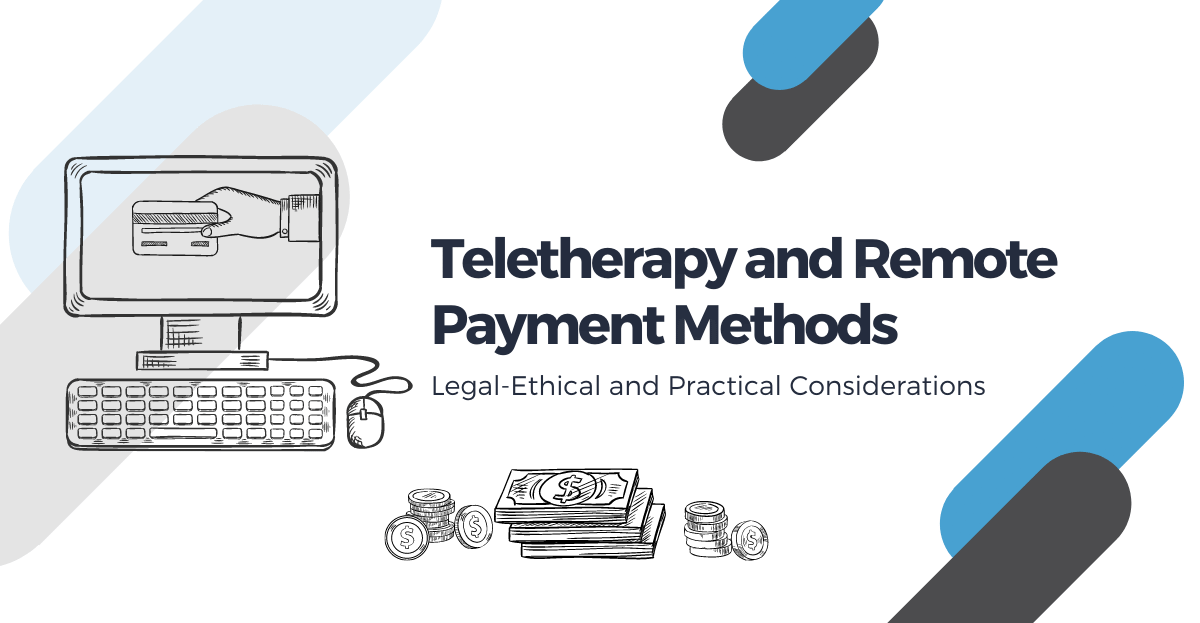1 CE Credit Hour
Self Study Course on Remote Payment
Teletherapy and Remote Payment Methods, Legal-Ethical and Practical Considerations
Join Roy Huggins, LPC NCC and Liath Dalton as they discuss remote payment methods in the context of online therapy.
1 CE credit hour
On Demand Self Study

Remote payments without an EHR
You don’t need a practice management system to take remote payment.
We’ll cover how to handle remote payment legally and ethically with and without a practice management system.

Ethical Start
Set up a teletherapy payment process that maintains client confidentiality and autonomy

Successfully Identify Secure Services
Determine which electronic payment services meet the learner’s HIPAA Security and PCI DSS compliance needs

Legal Ethical Lens
Maintain legal responsibilities and therapeutic relationships when holding client payment cards on file
Practical Real World Considerations
HIPAA doesn’t exist in a vacuum. We’ll approach a variety of real world examples so you can feel confident applying the remote payment principles in your practice.
So, thank you for making HIPAA as fun as it can be!! Keep it up! I am thankful to have found PCT early in my practice and I am glad you guys are in my life :)
Course Details
This introductory-level course for counselors, marriage and family therapists, clinical social workers, and counseling and clinical psychologists will equip learners to handle remote payments legally and ethically.
Title: Teletherapy and Remote Payment Methods, Legal-Ethical and Practical Considerations
Authors/Presenters: Roy Huggins, LPC NCC; Liath Dalton
CE Length: 1 CE hour
Legal-Ethical CE Hours: 1 legal-ethical CE hour
Educational Objectives:
- Set up a teletherapy payment process that maintains client confidentiality and autonomy
- Determine which electronic payment services meet the learner’s HIPAA Security and PCI DSS compliance needs
- Maintain legal responsibilities and therapeutic relationships when holding client payment cards on file
Syllabus:
- Electronic payment services and teletherapy
- Overview of methods for taking payments remotely
- Debt and harmful multiple relationships
- Passing finance fees on to clients, legal and ethical considerations
- Compliance issues that arise when using electronic payments
- The Payment Card Industry Data Security Standard (PCI DSS)
- Financial services and the HIPAA Business Associate Rule
- How electronic payment services use and move confidential information
- What happens to client info when you run their card on your phone or tablet
- What happens to client info when their payment card info is stored in your practice management system or other payment service
- Holding client payment cards on file, legal-ethical considerations
- What happens to client info when using a social cash service like Venmo
- Real world examples
- Collecting remote payments legally and ethically
- Charging a card on file legally and ethically
- Invoicing and tracking payments legally and ethically
Meet Our Presenters
Presented by Roy Huggins LPC, NCC with Liath Dalton

Roy Huggins, LPC NCC, is a counselor in private practice who also directs Person-Centered Tech. Roy worked as a professional Web developer for 7 years before changing paths and makes it his mission to grow clinicians’ understanding of the Internet and other electronic communications mediums for the future of our practices and our professions.
Roy is an adjunct instructor at the Portland State University Counseling program where he teaches Ethics and is a member of the Zur Institute advisory board. He has acted as a subject matter expert on HIPAA, security, and clinical use of technology for Counseling licensure boards, and both state and national mental health professional organizations. He has co-authored or authored 2 book chapters, and he routinely consults with mental health colleagues on ethical and practical issues surrounding tech in clinical practice. He served for 5 years on the board of the Oregon Mental Health Counselors Association and then the Oregon Counseling Association as the Technology Committee Chair.
He really likes this stuff.

Liath Dalton is PCT’s deputy director and a co-owner. Liath is especially passionate about helping therapists be resourced and supported in navigating the security compliance process and identifying the solutions and processes that meet the particular needs of their practices. Liath’s consultation area of expertise is focused on selecting the right combination of services and tech that not only meet the legal-ethical needs of mental health practices, but also the functionality, efficiency, and cost-effectiveness needs as well.
Additional Information
Citations:
- Augsburger, M. (2013, Feb 13). The Convergence of Health Care and Banking. Retrieved Jan 11, 2014, from Health Care Law Matters: http://www.healthcarelawmatters.com/compliance/the-convergence-of-health-care-and-banking/
- Gutheil, T. G., & Gabbard, G. O. (1993). The Concept of Boundaries in Clinical Practice: Theoretical and Risk-Management Dimensions. Retrieved April 26, 2013, from Articles, Research, & Resources in Psychology: http://kspope.com/ethics/boundaries.php
- PCI Security Standards Council. (n.d.). PCI Security. Retrieved August 31, 2020, from https://www.pcisecuritystandards.org/pci_security/
- Square Community Manager. (2018, July 23). Understanding PCI Compliance. Retrieved August 31, 2020, from https://www.sellercommunity.com/t5/General-Discussion/Understanding-PCI-Compliance/m-p/87880
- US Dept. of Health and Human Services. (2006). HIPAA Administrative Simplification . Washington, DC: Author.
- US Dept. of Health and Human Services. (2013). HIPAA Omnibus Final Rule . Washington, DC: Author.
- Zur, O. (2011). Dual Relationships, Multiple Relationships & Boundaries In Psychotherapy, Counseling & Mental Health. Retrieved May 20, 2013, from Zur Institute: http://www.zurinstitute.com/dualrelationships.html
Accuracy, Utility, and Risks Statement: This program discusses strategies for complying with HIPAA, PCI DSS, and covered ethics codes. It may not include information on all applicable state laws. Misapplication of the materials, or errors in the materials, could result in data breaches or non-compliance with applicable laws or ethics codes.
Conflicts of Interest: None noted
Commercial Support: None
